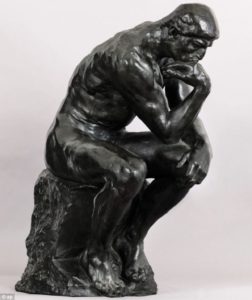If you are in any way religious then please be warned – you really need to look elsewhere for guidance as you may find the following analysis unsettling.
Religion is the irrational belief in man made fantasies, created in order to reinforce the privileges of the establishment. It represents precisely the sort of propaganda and brain washing that independent thinking is seeking to avoid. The following brief history of notable thinkers therefore distinguishes the various periods of recorded thinking according to the influence of religion or the establishment.
4000 BC to 600 BC Early Foundations
4,000 BC – There is very little record of the earlier Sumerian civilisation, and detailed evidence of Western civilisation is first found in Egypt. A written language and agriculture around the Nile, Tigris and Euphrates rivers suggest a level of planning and forethought representing the beginnings of civilisation. However, the Egyptians soon became pre-occupied with death and religious fantasies. They believed that the soul went to the underworld, and then came back to the body, and the most memorable remnants of their society are the relics of this obsession.
2,500 BC – Beginning of Minoan culture on Crete
2,000 BC – The Babylonians were descended from the Sumerians, They were primarily concerned with happiness and prosperity in this world, not the afterlife. Their achievements were considerable and remain of influence to this day, with the development of cuneiform writing, the establishment of the 24 hour day and 360 degree circle etc, and a long history of accurate written records of events, predicting planetary eclipses etc.
Around this time western civilisations generally appeared to be obsessed with fertility cults – emphasising male and female. This eventually found its way into the Christian religion – Mother Earth became Diana became Virgin Mary.
Politics and religion were combined, so that religious dogmas became preserved as rules of law – eg Pan.
1,800 BC – Egypt was conquered by the Semites.
1,600 BC – The Cretans had a cheerful, decadent culture, creating the famous Palace of Minos at Knossus, home to the Minoan culture. They spread to Greece around 1600 BC, and became known as the Mycenaean culture, surviving until 900 BC.
Greece itself was then invaded in 3 waves:
Ionian – adopted the Minoan religion and culture
Achaens – ditto
Dorians – retained their own indo-european religion
700 BC – Trade and universal coinage began in Greece, which became the centre of western civilisation, surrounded on all sides by “barbarians”.
650 BC – Homer’s Iliad and Odyssey became important cultural influences, and formed the basis of education of all students. They were probably written as a collaboration, rather than by one man.
Religions at this time were mainly:
Pan – the god of nature and companion of the nymphs. Lover of music and copulation.
Dionysus/Bacchus – fascinated by “ecstasy” brought on by wine, but also believed in spiritual ecstasy where god enters the body.
Orpheus – the soul experiences eternal bliss or torment depending on ones life on earth. One can redeem or cleanse soul on earth by eg not eating meat. Man is a mix of earthly and divine with varying proportions. Founded religious communities or “churches” which anyone could join, regardless of race or sex.
Olympian – Greek gods living on Mount Olympus interfering in man’s affairs
There was popular debate over the relative importance of “Prudence” – science, forethought and civilisation – and “Passion” – including art and music
This was a fluid time with the constant creation and trial of religious ideas. This may have been because there was no “priesthood” class in Greece, unlike in oriental religions or ancient Egypt etc. Priests generally preserve dogmas – they do not experiment and create new ones.